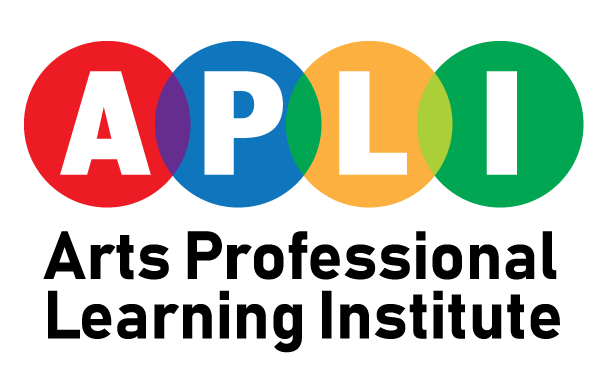Voice of APLI: It’s Teaching Artist - How I got to (re)know both
Ever year the email popped up in my inbox. It came during that liminal time when I was still early into yet another fall semester of teaching college writing but still longing for that energy I’d experienced during summer break. No, not vacation, but time to reflect and create--those very things that made teaching possible in the first place
The email said something about artists in education. It urged, “Apply…Apply to APLI.” I found the homophonic pun amusing. But not enough to actually apply. I promptly deleted it, and got back to my lesson plans. Year after year I did this. Who had time for another application? Besides, it was for “teaching artists.” Yes I was a teacher. Although I am primarily a college level instructor (mostly at Rutgers Newark), over the last 10 years, I have also taught students from various primary and high school grades as a Woodrow Wilson summer writing fellow, an instructor for an early college humanities program, and at writing and film workshops at the Newark Public Library. Yes, I wrote poetry and was making forays into documentary and art films. But what did the two have to do with each other or with me?
Lots, apparently. Because when the application announcement made its annual appearance in my inbox in 2022, something told me, hold up. Let me actually see what this is about:
“The Arts Professional Learning Institute is New Jersey's arts education professional learning program for teaching artists and school educators.
APLI aims to engage the arts educator in inclusive, progressive, arts-based professional learning experiences so that the whole student can be reached, inclusive of race, ethnicity, gender identity, sexual orientation, and perceived ability.
Wait. This was me. And it was my students. I had been teaching in some form or other my entire professional career—as a natural extension of poetry and visual arts practices I’ve engaged in since childhood. I became a tutor first, then adjunct instructor, always through art, not despite it. And the students I was teaching wanted what I had wanted, and didn’t quite get as a young person: creative affirmation and to be seen as whole, inclusive of race, ethnicity, gender identity, sexual orientation, and ability. Somewhere along the line, I had forgotten this.
So I applied. And I was accepted—to the 2023 APLI program, and by a cohort of fellow practitioners whose insights and guidance as we experienced several remarkable workshops together reaffirmed why teaching and art are inextricably linked and vital components of a healthy, functioning, inclusive society.
Teaching and Artmaking are soul-work. At their best, they prioritize human experience and connection, and it’s no surprise that’s why both teachers and artists experience challenges that can take their toll and lead to burnout. And yet, human experience and connection, the pure joys of creating, are arguably inherent aspects of any profession. So why are teachers and artists often harder on themselves than other folks? Why do we sometimes forget the teaching in art and the art in teaching, segregating the two like I did? “Radical Optimism for Educators and Artists” our first workshop, facilitated by artist and educator Rodney Camarce reminded us that answers to those complex questions are often rooted in the stories we tell and the stories we don’t—to save face, to literally survive, to pay bills and support ourselves and our families. All of these elements are typically regarded as the “grit and resilience” that writer, artist, and educator Dr. Raquel Wright-Mair of Rowan University deconstructed in our second workshop, “Going Beyond Grit”. Through peer discussion and collaborative activities, we interpreted case studies of “grit and resilience” and how these, far from being well-meaning advice, are often dream killers and tools of disenfranchisement, of ourselves and our students. These are the same colonizing attitudes that the art and healing training of Creative Praxis then revealed alternatives to in our third workshop, “Demystifying Decolonization in the Classroom.” The sound and movement activities Creative Praxis led us through were natural precursors to our final workshop “The Intentional Cultivation of Joy!” where we were reminded of the incredibly affirming power of “play”—whether through the performance exercises and storytelling facilitated by actor, artist and educator Gha’il Rhodes Benjamin or cooking communally with chef Vincent Boddie. All of these wonderful teaching artists—as well as my cohort peers, embodied teacher as artist and artist as teacher, and the very thing that binds the two: community.
But community-building also depends on resources, knowing what they are and what we can potentially bring. As fellow poet Millicent Borges Accardi recently said to me, “Knowing IS useful.” Millicent, like me, came up in scrappy, working class ways. I nodded. Knowing is useful. Knowing how to sustain our soul work is not only useful, it is imperative.
So to all you lesson planners out there: get to know APLI and APPLY!
About the 2023 Voice of APLI: paulA neves
paulA neves is a Luso-American poet, cross-disciplinary artist and educator whose work explores, among other themes, first generation American and immigrant experience, artists' communities, gender, queerness, working class aspirations, and the confluence of urban and natural environments. The recipient of the 2020 NJ Poets Prize from the Journal of NJ Poets, paulA is the author of the poetry chapbook capricornucopia: the dream of the goats (Finishing Line Press 2018), the co-author (with Nick Kline) of the photography and poetry collection Shirts & Skins (Shine Portrait Studio Press 2017) and the co-founder (with Boris Tsessarsky) of Parkway North Productions, which produced the award-winning documentary The Remedy (2021) about two NJ hip hop artists/musicians.
The Arts Professional Learning Institute (APLI) is a co-sponsored project of Young Audiences Arts for Learning NJ & Eastern PA and the New Jersey State Council on the Arts, a partner agency of the National Endowment for the Arts. It is generously supported by the Grunin Foundation and the Geraldine R. Dodge Foundation.


